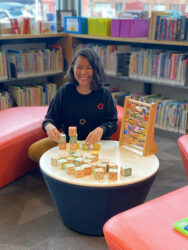
Research shows that being involved in early learning programs yields lifelong benefits. But what happens when there aren’t enough spots available at local learning centers?
The State of Washington estimates that only about a quarter of children ages birth to five are served by licensed child care or preschool. Many working families require other options – particularly families of color.
The library plays an essential role in filling this gap. According to CiKeithia Pugh, early learning program manager at The Seattle Public Library, library programs are critical to supporting access and expanding equity.
Programs like Kaleidoscope Play and Learn, supported in part by Foundation donors, offer more than just a free space for early education. They provide families with connections to a host of resources.
The program itself offers drop-in play groups for children from birth through age five. The library partners with community organizations to bring trained early childhood facilitators to work with children, parents, and caregivers on developmental activities.
During the pandemic, the Denise Louie Education Center presented virtual weekly sessions. Play and Learn is now back at library branches, in partnership with organizations including Chinese Information and Service Center and Villa Comunitaria.
Participants receive books and storytelling kits along with customized materials to address the needs that families and partner organizations identify. That includes art supplies, lacing boards to work on fine motor skills, or lessons delivered in Chinese, Spanish, or Vietnamese.
Partnership with community has always been a key element of library early learning programs, which are often co-designed with partner organizations. But Pugh said the changing landscape since the pandemic has only reinforced the importance of building trusted relationships.
“The library is welcoming people back, but we’re also being welcomed by partners to listen and learn,” she said. “And families want to know how they can connect past just this one program. We’ve been having candid conversations that help us ponder, what else could we be doing?”
Families report dealing with a childcare system with more demands and less resources than ever. Intentionally focusing on working with communities impacted by systemic racism, and with organizations that are deeply embedded in those communities rather than those with the largest profiles, helps the library meet people where they are.
Librarians have seen increases in requests for presentations on library services to community groups, field trips to branches, and library card sign-ups, Pugh said. Families have more opportunities to hear about programs and services which might benefit them. More broadly, the library better serves its role as a trusted space where everyone is welcome to learn and grow.
“Once you get into the library for one reason, a whole other world opens up,” Pugh said. “Play and Learn can be a gateway.”
